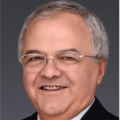Sunday, 28 February 2021
8:45 PM — 10:30 PM EST
Keynote 1: Imre Rudas, Óbuda University, IEEE Systems, Man, and Cybernetics Society
Keynote 2: Okyay Kaynak, Bogazici University
Monday, 1 March 2021
9:00 PM — 9:30 PM EST
Keynote 3: Erol Gelenbe, Polish Academy of Sciences (IITiS-PAN), Gliwice, Poland
Keynote 4: Luis Kun, Distinguished Professor Emeritus of National Security Affairs, National Defense University
KEYNOTE SPEAKERS
Keynote 1
Date: Sunday, 28 February 2021
Time: 8:45 PM — 10:30 PM EST
Topic: Advances of Cyber-Physical Control in Medical Applications
 Imre Rudas
Imre Rudas
Professor of Óbuda University, IEEE Fellow, President of IEEE Systems, Man, and Cybernetics Society, IEEE MGA Board Member
Imre J. Rudas graduated from Bánki Donát Polytechnic, Budapest in 1971, received the Master Degree in Mathematics from the Eötvös Loránd University, Budapest, the Ph.D. in Robotics from the Hungarian Academy of Sciences in 1987, while the Doctor of Science degree from the Hungarian Academy of Sciences in 2004. He received Doctor Honoris Causa degree from the Technical University of Košice, Slovakia, from “Polytechnica” University of Timisoara, Romania, from Óbuda University, and from Slovak University of Technology in Bratislava. He was awarded by the Honorary Professor title of Wroclaw University of Technology in 2013. He is active as a full university professor. He served as the President of Budapest Tech from 2003 till 2010. He was the founder of Óbuda University, the successor of Budapest Tec and was elected as the first President in the period 2010-2014. He served as the President of the Hungarian Rector’s Conference and member of European University Association in 2008. Now he is the Head of the Steering Committee of the University Research and Innovation Center. He has been the president of the Central European Living Lab for Intelligent Robotics since 2014. He is a Fellow of IEEE, Senior AdCom member of Industrial Electronics Society (IES), he served IES as a Vice-President in 2000-2001. He was elected as the Vice-President for Membership and Student Activities in IEEE System, Man and Cybernetics Society for the period 2015-2016. He is the Senior Past Chair of IEEE Hungary Section. He served IFSA (International Fuzzy System Association) as Vice-President and Treasurer for a period of 7 years; he had been the President of Hungarian Fuzzy Association for ten years. He had been the Vice-President of the Hungarian Academy of Engineers for four years. He serves as an associate editor of some scientific journals, including IEEE Transactions on Industrial Electronics, member of editorial board of Journal of Advanced Computational Intelligence, Editor-in-Chief of Acta Polytechnica Hungarica, member of various national and international scientific committees. He is the founder of the IEEE International Conference Series on Intelligent Engineering Systems (INES), IEEE International Conference on Computational Cybernetics (ICCC), IEEE International Symposium on Computational Intelligence and Informatics (CINTI, since 2000), IEEE International Symposium on Machine Intelligence and Informatics (SAMI, since 2003), IEEE International Symposium on Intelligent Systems and Informatics (SISY, since 2003), IEEE International Symposium on Applied Computational Intelligence and Informatics (SACI, since 2004), IEEE International Symposium on Logistics and Industrial Informatics (LINDI, since 2007). He has served as General Chair and Program Chair of numerous scientific international conferences. His present areas of research activities are Computational Cybernetics, Robotics, Cloud Robotics, Internet of Anything, Soft Computing, Fuzzy Control and Fuzzy Sets. He has edited and/or published 22 three books, published more than 800 papers in international scientific journal, conference proceedings and book chapters.
Keynote 2
Date: Sunday, 28 February 2021
Time: 8:45 PM — 10:30 PM EST
Topic: Digital Twins in Healthcare
 Okyay Kaynak
Okyay Kaynak
Professor of Bogazici University, IEEE Fellow
Okyay Kaynak received the B.Sc. (first-class honors) and Ph.D. degrees in electronic and electrical engineering from the University of Birmingham, Birmingham, U. K., in 1969 and 1972, respectively. From 1972 to 1979, he held various positions within the industry that included 3.5 years in Saudi Arabia, working as a project engineer. In 1979, he joined the Department of Electrical and Electronics Engineering, Bogazici University, Istanbul, Turkey. He has served as the Chairman of the Computer Engineering and the Electrical and Electronic Engineering Departments and as the Director of Biomedical Engineering Institute at this university. Currently he is an Emeritus Professor, holding the title of UNESCO Chair on Mechatronics. He has hold long-term (near to or more than a year) Visiting Professor/Scholar positions at various institutions in Saudi Arabia, Japan, Germany, U.S., Singapore and China. He was, in 2013, awarded the prestigious “1000 People” Program professorship at Harbin Institute of Technology, China. His present affiliation is with University of Science and Technology Beijing, China.
Dr. Kaynak's current research interests are in the broad field of intelligent systems. He has authored three books, edited five and authored or coauthored more than 400 papers that have appeared in various journals, books and conference proceedings. Dr. Kaynak is a fellow of IEEE. He is or has served on the Editorial or Advisory Boards of a number of scholarly journals. He was the Editor-in-Chief of IEEE Trans. on Industrial Informatics during 2005-2006, IEEE/ASME Trans. on Mechatronics during 2014-2016 and Co-Editor in Chief of IEEE Trans. on Industrial Electronics during 2009-2012. Dr. Kaynak is active in international organizations, has served on many committees of IEEE and was the president of IEEE Industrial Electronics Society during 2002-2003. He received IEEE Third Millennium Medal (2001), IEEE/IES Anthony J. Hornfeck Service Award (2005) and IEEE/IES Dr.-Ing. Eugene Mittelman Achievement Award (2011). Most recently, he received the China Friendship Award (2016) and Humboldt Research Prize (2016).
Keynote 3
Date: Monday, 1 March 2021
Time: 9:00 PM — 9:30 PM EST
Topic: Improving Network Security with the Cognitive Packet Network
Abstract: The security of e-Health systems is of capital importance, as the Wannacry attack showed us some years ago when the human health systems suffered hundreds of millions of euros of damages due to one cyberattack. However, security is not just a matter of understanding that an attack is going on, but rather that of reacting to an attack and mitigating it, within seconds or minutes. This keynote will show how this can be achieved in real-time using the Cognitive Packet Network protocol. The presentation will include methods that have been developed within the EU funded H2020 SerIoT and FP7 NEMESYS projects.
 Erol Gelenbe
Erol Gelenbe
Professor, IEEE Life Fellow, ACM Fellow, Fellow of National Acad. of Engineering of France, Fellow of Royal Academy of Sciences of Belgium, Fellow of Science Academies of Hungary, Poland and Turkey, Academia Europaea
Institute of Theoretical and Applied Computer Science, Polish Academy of Sciences (IITiS-PAN), Gliwice, Poland
Erol Gelenbe (Life Fellow, IEEE) Fellow of the Association for Computing Machinery, the International Federation of Information Processing, the Royal Statistical Society, and the Institution of Engineering and Technology, was born in Istanbul, graduated from TED Ankara Koleji, and was awarded the BS (1966) by METU (Ankara), the MS (1968) and PhD (1970) by Polytechnic Institute of NYU, and the DSc (1973) degree by Sorbonne University, Paris. Professor at the Institute of Theoretical and Applied Informatics, Polish Academy of Sciences, his previous positions include Chaired Professorships at Imperial College, University of Central Florida, Duke University, Université Paris-Descartes and Paris-Orsay, and Université de Liège (Belgium). Renowned for pioneering mathematical models of computer systems and networks, inventing G-Networks and Random Neural Networks, he graduated over 90 PhDs, including 24 women. He has contributed to industry by developments that include the Queueing Network Analysis Package, the XANTOS fiber-optics local area network, the SYCOMORE distributed voice-packet switch, the manufacturing simulator FLEXSIM, and the C2 (Command and Control) Agents software. Awards include “honoris causa” degrees from Università di Roma II (1996), Bogazici University (Istanbul) (2004), and Université de Liège (Belgium) (2006), the Parlar Foundation Science Award (1994), Grand Prix France Télécom of the French Acad. of Sciences (1996), ACMSIGMETRICS Life-Time Achievement Award (2008), IET Oliver Lodge Medal, (2010), and the “In Memoriam Dennis Gabor Prize” of the Hungarian Acad. of Sciences (2013). He was elected Fellow of Academia Europaea, the French National Acad. of Technologies, the Science Acad. of Turkey, the Royal Acad. of Belgium, the Hungarian and Polish Academies of Science. He was awarded the honors of Chevalier de la Légion d’Honneur, Chevalier des Palmes Académiques, and Commandeur du Mérite of France, and Commendatore al Merito and Grande Ufficiale dell’Ordine della Stella of Italy. He serves as associate Editor of IEEE Transactions Cloud Computing, Acta Informatica, Performance Evaluation, and joint Editor-in-Chief of SN Computer Science, his consultancies have included INRIA, France-Telecom, Bull, IBM, Thomson CSF, Bell Labs, BT, General Dynamics UK, Huawei. Principal Investigator of many European Union research projects, Coordinator of FP7 NEMESYS and H2020 SerIoT, he has also won numerous grants from the National Science Foundation, the Engineering and Physical Sciences Research Council, industry and other organizations.
Keynote 4
Date: Monday, 1 March 2021
Time: 9:00 PM — 9:30 PM EST
Topic: From Al Gore’s Information Superhighway to the Era of Disinformation and COVID-19. Balancing Disease Prediction, Prevention and Cure with Assuring Access, and the Protection of Privacy of Personal information
Abstract: Congressman Al Gore provided intellectual leadership by helping create the vision of the potential benefits of high speed computing and communications and on 24 June, 1986, the Supercomputer Network Study Act of 1986 was introduced by him. As a Senator, he began to craft the High Performance Computing and Communication Act (HPCC) of 1991 which led to the National Information Infrastructure (NII) which Gore referred to as the "information superhighway". In the 90s the Clinton-Gore administration worked on the concepts of “Electronic Bill of Rights” of using high tech to deliver government and social services, distance learning and telemedicine. On March 21, 1994 VP AL GORE gave a keynote on the creation of a Global Information Infrastructure (GII), known also as the Information Superhighways Speech at the World Telecommunication Development Conference, in Buenos Aires, Argentina. While the 21st Century was coined as the Information Era, it has also become the disinformation one. As advances in science and technology offer the opportunity to include early prediction, prevention and even cure of disease. Yet, rather than creating a single electronic health record (EHR) that were supposed to avoid medical errors, reduce costs and improve care, most doctors and hospitals have created silos of non-interoperable EHRs. (It is estimated that between 400,000 to 440,000 individuals die every year in the US from medical errors, making it the 3rd cause of death (in “normal times”), after heart disease and cancer.) In addition, the current COVID-19 pandemic has provided a unique environment that also exposes new challenges. For many the high price of access makes it impossible to use this superhighway while for others the protection of privacy and confidentiality of personal information have become impediments to its use. How can society resolve all these threats?
 Luis Kun
Luis Kun
Distinguished Professor Emeritus of National Security Affairs, National Defense University
While at IBM Dr. Kun developed the 1st six healthcare applications that ran in an IBM PC. He worked with Palo Alto SC computer scientists to develop on an IBM platform: the 1st Medical Imaging Display Station, and with Medical Physicists at UTSMC & Parkland Hospital to develop the first Picture Archival Communications System. While working on the “All Digital Medical Record” in Gaithersburg, he was technical manager in the requirements definition for the Point of Care System with/for nurses (academia and industry). As Senior IT Advisor representing the Agency for Health Care Policy and Research (AHCPR), he chaired the Privacy and Security of Information in the Vice-president’s Committee on Telehealth and was one of the 9 authors of the first Report to the US Congress on Telemedicine. He also led and defined the sections on: Telehealth, Computer-based Patient Records, and Clinical Decision Support while working with individuals representing 15 different parts of the Federal Government and as part of the White House Subcommittee on Computing, Information and Communications R&D.
Dr. Kun was the founding chair of the IEEE USA Healthcare Engineering Policy Committee’s Electronic Medical Record and HPCC WG, and prior to 911, the Founding Chair of the Bioterrorism and Homeland Security WG. In 2007 he became the Founding chair of IEEE-USA’s Critical Infrastructure Protection Committee. For the 1st time ever, he edited /produced 3 Special Issues of the IEEE EMBS Magazine (2002, 2004 and 2008), which included segments written by invited Legislators and were distributed among members of the US Congress.
In July 1997, as invited speaker to the White House, he was largely responsible for the first Telemedicine Homecare Legislation signed by President Clinton, August 1997. As a Distinguished Fellow at the CDC in Atlanta, first as the Senior Computer Scientist for the Health Alert Network for Bioterrorism and later as the Acting Chief Technology Officer for the National Immunization Program he defined how IT would be used in the future. He developed and taught for the new program in Public Health Informatics at the Rollins School of Public Health, at Emory University the courses on Knowledge Management, and AI in Public Health. As a Professor of Homeland Security (HLS) at the National Defense University he developed all the curricula on that track: HLS Inf. Management, HLS Tools & Techniques and Protection of Critical Infrastructures. Kun graduated from Uruguay’s Merchant Marine Academy and holds a BSEE, MSEE and Ph.D. in Biomedical Engineering from UCLA. He is a (Lifetime) Fellow of the IEEE, the American Institute for Medical and Biological Engineering, and the International Academy of Medical and Biological Engineering. He is a Distinguished Professor Emeritus of National Security Affairs (CHDS/NDU). He is co-founding Editor in Chief of Springer's Journal of Health and Technology. His awards include: AIMBE's first-ever Fellow Advocate Award; IEEE-USA Citation of Honor Award, "For exemplary contributions in the inception and implementation of a health care IT vision in the US"; from the US Surgeon General, AHCPR Administrator’s Award of Merit for exceptional dedication and professional achievements that have greatly enhanced the recognition of AHCPR’s research in the HPCC Program. Golden Core Award by the IEEE CS. Named: "Profesor Honoris Causa" Favaloro University, (Argentina); "Distinguished Visitor" by City of Puebla, Mexico.


